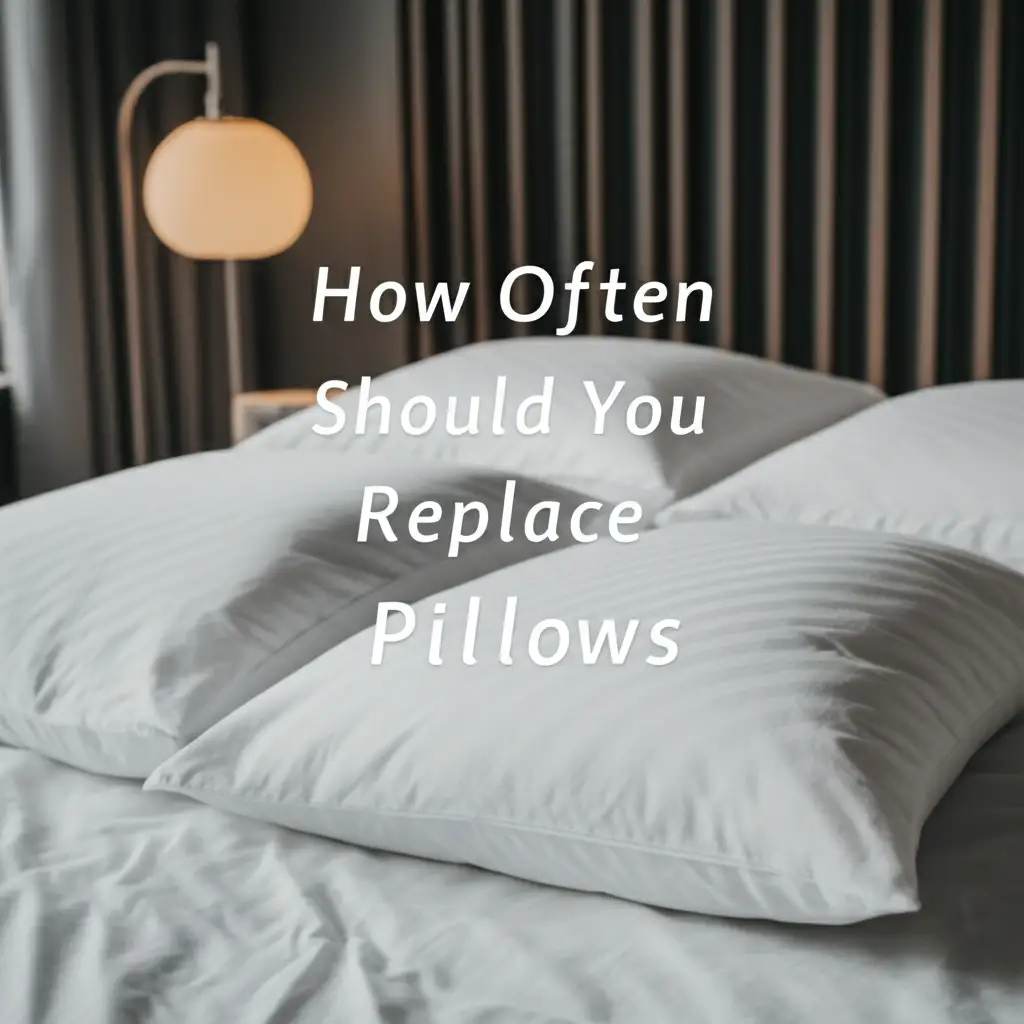· Liora Benning · Mattress Health · 17 min read
Can Mattress Cause Neck Pain

Can Your Mattress Be The Hidden Cause of Neck Pain?
Waking up with a stiff neck can ruin your day before it even begins. Many people search for quick fixes, like stretching or pain relievers. However, the root of the problem might lie right under your head. Your mattress plays a critical role in how your neck feels each morning.
I often think about how much time we spend sleeping. This period is vital for body recovery. If your sleep surface does not provide proper support, your neck suffers. This article explores how a mattress can cause neck pain. We will look at signs of a bad mattress. We will also discuss how to find solutions for better sleep and a pain-free neck.
Takeaway
- Assess Mattress Support: Ensure your mattress maintains natural spinal alignment.
- Evaluate Pillow Choice: Select a pillow that supports your head and neck in your preferred sleep position.
- Check Mattress Age: Old mattresses lose support and cause discomfort.
- Observe Sleep Posture: Adjust how you sleep to reduce neck strain.
- Consider Firmness: Match mattress firmness to your body and sleep needs for optimal comfort.
Can a mattress cause neck pain?
Yes, a mattress can directly cause neck pain. A mattress that lacks proper support, is too old, or has the wrong firmness can misalign your spine. This misalignment places undue stress on your neck muscles and cervical spine. It leads to stiffness, discomfort, and chronic pain upon waking.
The Spine’s Needs: How Mattress Support Affects Neck Health
Your spine has natural curves, including in your neck. These curves need support, even during sleep. A good mattress helps maintain this natural alignment. When your spine stays straight, your muscles can relax. This relaxation prevents strain and pain.
A mattress that sags or is too soft lets your body sink too much. This causes your spine to bend unnaturally. Similarly, a mattress that is too firm can push your shoulder or hip too high. This also throws off alignment. Both situations stress your neck. The muscles work harder all night to keep your head in place.
Proper support distributes your body weight evenly. It cradles pressure points like your shoulders and hips. This keeps your neck in line with the rest of your spine. When your spine is properly aligned, your neck muscles do not strain. You wake up feeling refreshed, not sore.
Understanding Cervical Spine Alignment
The cervical spine is your neck’s backbone. It needs to remain in a neutral position while you sleep. Imagine a straight line from your head down to your tailbone. Your pillow and mattress work together to keep this line straight. If your mattress does not offer enough support, your head might tilt upwards or downwards.
This constant tilt puts pressure on your cervical discs. It also stretches your neck muscles. Over time, this leads to chronic neck pain. A mattress that conforms to your body can help. It fills in the gaps around your curves, giving consistent support. This keeps your cervical spine in its healthy curve.
The Role of Mattress Firmness
Mattress firmness is a personal choice. Yet, it directly impacts neck comfort. A mattress that is too soft does not offer enough resistance. Your body, especially your hips and shoulders, sinks too far. This makes your spine curve like a hammock. Your neck will try to compensate, leading to strain.
Conversely, a mattress that is too firm might not allow your shoulders and hips to sink enough. This creates pressure points. It can also force your spine into an unnatural angle. For most people, a medium-firm mattress provides the best balance. It offers enough support to keep the spine aligned. It also has enough give to cushion pressure points. The right firmness helps your neck muscles truly relax. Finding the right firmness for your body type and sleep position is crucial for preventing neck pain.
When Your Mattress Fails: Signs It’s Causing Neck Pain
Your mattress is an investment in your health. Over time, even the best mattresses wear out. A worn-out mattress stops giving you the support you need. Recognizing these signs helps you act before neck pain becomes severe. Paying attention to your body and your mattress can save you discomfort.
If you notice new aches, especially in your neck or shoulders, your mattress might be the problem. These pains often appear only after sleeping. They feel better after you move around for a while. This pattern strongly points to your sleep surface. Do not ignore these early warnings.
Checking your mattress for visible signs of wear is also important. These signs tell you about its condition. They help you decide if it is time for a change. A good mattress provides consistent support across its surface. When it starts to fail, that consistency disappears. You might notice your body sinking unevenly.
Waking Up with Stiffness
Waking up with neck stiffness is a clear indicator. This stiffness is not just a minor ache. It often makes turning your head difficult. It can also lead to headaches. This happens because your neck muscles are working overtime all night. They try to stabilize your head on a poor surface.
If your neck feels fine during the day but stiff in the morning, your mattress is likely the culprit. The poor support causes your neck to hold an awkward position for hours. This strains muscles and ligaments. The stiffness shows your body’s protest against this poor alignment. It is a sign that your mattress is failing to do its job.
Visible Sagging and Indentations
Look at your mattress surface. Do you see dips or valleys where you typically sleep? These are called indentations or sagging. This sagging means the mattress materials have lost their resiliency. They no longer offer proper support. Your body sinks into these hollows. This forces your spine into unnatural curves.
Sagging is a major cause of neck and back pain. The areas that need the most support, like your hips and shoulders, sink deepest. This pulls your whole spine out of alignment. If your mattress has visible dips, it is time for a replacement. These indentations show a clear lack of support. Knowing how long does a Comforpedic mattress last can help you anticipate when your mattress might start showing these signs of wear.
Beyond the Mattress: How Pillow Choice Impacts Neck Pain
While your mattress sets the foundation, your pillow is equally important for neck health. A pillow fills the gap between your head and the mattress. It works with the mattress to keep your cervical spine aligned. The wrong pillow can undo all the good a proper mattress provides. It can also worsen neck pain caused by a less-than-perfect mattress.
Pillows come in many shapes, sizes, and materials. Finding the right one depends on your unique needs. Your sleep position heavily influences the type of pillow you require. A good pillow keeps your head level with your spine. It prevents your neck from bending too far up, down, or to the side.
Even if you have the best mattress, a poor pillow can still cause neck pain. It can create an improper angle for your head. This stresses your neck muscles and joints. Consider your pillow as a partner to your mattress. Both must work in harmony for optimal neck comfort.
Finding the Right Pillow Height
Pillow height, or loft, is crucial for neck alignment. If your pillow is too high, it pushes your head forward. This creates a painful angle for your neck. Think of it like looking down at your phone for hours. If your pillow is too low, your head drops back. This also strains the neck.
The ideal pillow height depends on your sleep position and body type. Side sleepers generally need a thicker pillow. This fills the space between their ear and shoulder. Back sleepers need a medium-loft pillow. This supports the natural curve of the neck without pushing the head too far forward. Stomach sleepers usually need a very thin pillow or no pillow at all. A correct pillow height ensures your neck remains in a neutral position.
Pillow Material and Support
Pillow material affects both comfort and support. Different materials offer different levels of firmness and moldability. Memory foam pillows conform to the shape of your head and neck. They provide personalized support. This can be great for maintaining alignment. Latex pillows are similar but offer more bounce and breathability.
Down or feather pillows are soft and luxurious. However, they might not offer enough firm support for some. They can flatten too much during the night. Synthetic fill pillows are often affordable. They might lose their shape and support faster. Choose a material that holds its shape well. It must also provide consistent support throughout the night. This prevents your neck from shifting into awkward positions.
Sleep Position and Your Neck: Optimizing Alignment
Your preferred sleep position plays a significant role in neck health. Different positions put different stresses on your neck. Understanding how your position affects your spine helps you choose the best mattress and pillow. It also guides you in making small adjustments for better sleep.
No single sleep position works for everyone. However, some positions are inherently better for spinal alignment. Side and back sleeping are generally more recommended than stomach sleeping. Each position requires specific support to keep the neck in a neutral line. Paying attention to your sleep posture is a key step. It helps reduce and prevent neck pain.
Even small adjustments to your sleep position can make a big difference. For instance, using an extra pillow between your knees while side sleeping can align your hips. This then impacts your entire spine, including your neck. Optimizing your sleep position, mattress, and pillow creates a supportive sleep environment.
Side Sleepers and Neck Pain
Side sleepers need firm support from their mattress. The mattress must keep their spine straight. It must also allow their shoulder to sink slightly. If the mattress is too firm, the shoulder stays too high. This puts pressure on the neck. If it is too soft, the hips and shoulders sink too much. This makes the spine curve downwards.
For side sleepers, a thicker pillow is essential. The pillow must fill the gap between the ear and the shoulder. This keeps the head aligned with the spine. A pillow that is too thin or too thick will cause neck strain. Many side sleepers find relief with memory foam or latex pillows. These materials contour to the neck’s curve. They provide consistent support all night.
Back Sleepers and Neck Pain
Back sleepers generally have the easiest time maintaining spinal alignment. Their mattress should support the natural curve of their lower back. It must also keep their spine straight. A medium-firm mattress often works best for back sleepers. It supports without creating pressure points.
For back sleepers, the pillow is critical. It should be medium-loft and supportive. The pillow needs to cradle the neck’s natural curve. It must not push the head too far forward. A pillow that is too high causes the chin to tuck. A pillow that is too flat causes the head to drop back. Both lead to neck pain. A cervical pillow, designed with a specific contour for the neck, often helps back sleepers.
Stomach Sleepers: A Risky Position
Stomach sleeping is generally considered the worst position for neck health. When you sleep on your stomach, you must turn your head to the side. This holds your neck in an unnatural, twisted position for hours. This prolonged twist puts severe strain on the cervical spine. It also compresses the nerves.
If you must sleep on your stomach, try to minimize the negative impact. Use a very thin pillow or no pillow at all. This reduces the angle of your head turn. You can also place a pillow under your pelvis. This helps flatten your spine and reduce the arch in your lower back. However, avoiding stomach sleeping is the best advice for neck pain prevention. Slowly transition to side or back sleeping if possible.
Mattress Lifespan and Its Effect on Neck Pain
Every mattress has a limited lifespan. Like any other product, its materials break down over time. As a mattress ages, it loses its ability to provide proper support. This breakdown directly impacts your spinal alignment. An old mattress is a common, but often overlooked, cause of neck pain.
Most mattresses last between 7 and 10 years. However, this varies by type and quality. After this period, the internal components, like springs or foam, begin to degrade. This leads to sagging, soft spots, and uneven support. If your mattress is past its prime, it might be the reason for your morning aches.
Replacing an old mattress is a significant investment. However, consider the cost of chronic pain and poor sleep. A new mattress can greatly improve your comfort. It restores proper spinal support. This helps relieve existing neck pain. It also prevents future issues.
How Age Degrades Mattress Support
Over time, mattress materials wear out. Innerspring mattresses, for example, have coils that lose their springiness. They can sag in certain areas. This creates depressions where your body lies. Foam mattresses, like memory foam or latex, can soften and lose their density. This reduces their ability to bounce back and provide consistent support.
The constant pressure from your body creates permanent indentations. These indentations no longer offer the firm, even surface your spine needs. Your body sinks into these worn areas. This pulls your neck and spine out of alignment. This is why an older mattress contributes to daily neck stiffness. Regular maintenance, such as knowing how to rotate your mattress by yourself, can extend its life. However, even with care, a mattress will eventually wear out.
When to Consider a New Mattress
Several signs indicate it is time for a new mattress. If your mattress is visibly sagging or has permanent body indentations, it needs replacing. If you wake up with new aches and pains, especially in your neck or back, blame the mattress. This is true even if you sleep well otherwise. Your body might be adjusting to poor support.
Also, consider the age of your mattress. If it is older than 7-10 years, its materials are likely past their peak. If you sleep better on other mattresses, like at a hotel, your home mattress is failing. Regular cleaning, like knowing how to deep clean your mattress, can maintain hygiene but will not restore lost support. Do not wait for severe pain to act. Replacing your mattress proactively supports your neck health.
Solutions for Neck Pain: Improving Your Sleep Setup
Finding relief from neck pain often starts in the bedroom. Your sleep environment plays a huge role in how your neck feels. Small adjustments can lead to big improvements. Do not despair if your mattress is causing you pain. There are clear steps you can take to fix the problem.
The goal is to create a sleep setup that supports your natural spinal alignment. This includes your mattress, your pillow, and even your sleep habits. A comprehensive approach yields the best results. Take time to evaluate each component of your sleep system. You can then make informed changes.
Remember, pain is your body’s way of telling you something is wrong. Listen to it. Invest in your sleep health. A well-supported neck leads to better sleep quality. It also leads to a more comfortable, pain-free day. You deserve to wake up feeling refreshed.
Assessing Your Current Mattress
Start by carefully examining your existing mattress. Look for any visible dips, humps, or signs of wear. Lie on it and notice how your body feels. Does your spine feel straight? Or do your hips or shoulders sink too much? Have someone else observe your posture on the mattress. They can tell if your spine looks aligned.
Consider the age of your mattress. If it is older than 7-10 years, its supportive qualities are likely diminished. Think about how you feel when you wake up. Do you feel stiff or sore? Does the pain get better after you get out of bed? If the answers point to your mattress, it is time to consider options. You might need a new mattress that provides better support for your body type and sleep position.
Trying Different Pillow Options
Your pillow is your neck’s best friend or worst enemy. Experiment with different pillow types, lofts, and materials. Side sleepers often need a thicker, firmer pillow. This fills the gap between their head and shoulder. Back sleepers need a medium-loft pillow that cradles the neck’s curve. Stomach sleepers should use a very thin pillow or no pillow at all.
Consider pillows made of memory foam or latex. These materials offer good contouring and support. Try a cervical pillow designed to support the natural curve of your neck. Pay attention to how your neck feels after a few nights with a new pillow. It might take some time to find the perfect match. A good pillow completes your sleep system.
Adjusting Sleep Habits
Beyond your mattress and pillow, your sleep habits matter. Try to adopt a sleep position that promotes good spinal alignment. Side sleeping with a pillow between your knees and a proper head pillow is good. Back sleeping with a supportive pillow under your neck is also good. Avoid stomach sleeping as much as possible.
Also, consider what you do before bed. Avoid looking at screens for a long time. This often causes “tech neck” due to forward head posture. Gentle stretching before bed can also help relax neck muscles. Ensure your bedroom is dark, quiet, and cool. A good sleep environment helps your body fully relax. This allows your mattress and pillow to do their best work.
FAQ Section
Can a too-soft mattress cause neck pain?
Yes, a mattress that is too soft can cause neck pain. It allows your body to sink too deeply. This creates a hammock effect for your spine. Your head and neck often end up in an awkward angle relative to your body. This forces your neck muscles to strain all night. This leads to stiffness and pain when you wake.
Can a too-firm mattress cause neck pain?
Yes, a mattress that is too firm can also cause neck pain. A firm mattress may not contour to your body’s natural curves. This prevents your shoulders and hips from sinking slightly. It can push your spine out of alignment. This creates pressure points and keeps your neck muscles tense. Proper support should cradle, not push.
How long does it take for a new mattress to help neck pain?
It can take a few days to a few weeks for a new mattress to help neck pain. Your body needs time to adjust to the new support. Muscles and joints, previously strained, need to relax and realign. Be patient during this adjustment period. You should notice a gradual reduction in pain.
What type of mattress is best for neck pain?
A medium-firm mattress is often best for neck pain. This firmness level provides a balance of support and pressure relief. It helps maintain natural spinal alignment. Materials like memory foam or latex are good choices. They contour to the body while offering consistent support. The best type also depends on your sleep position and body weight.
Does rotating my mattress help with neck pain?
Yes, rotating your mattress can help with neck pain. Regular rotation distributes wear evenly across the mattress surface. This prevents permanent indentations from forming in one area. By evening out wear, you maintain consistent support. This keeps your spine aligned and helps reduce pressure on your neck.
Conclusion
Your mattress is more than just a place to sleep. It is a critical component of your health. A mattress that lacks proper support can indeed cause neck pain. It throws your spine out of alignment. This puts undue stress on your neck muscles and joints. Recognizing the signs of a failing mattress is important. Look for sagging, age, and morning stiffness. This helps you identify the problem.
Finding the right mattress and pillow is an investment in your well-being. A medium-firm mattress typically provides optimal support. It helps keep your cervical spine in its natural, healthy curve. Pair this with a pillow suited to your sleep position. This creates a supportive sleep environment. Remember that an older mattress simply loses its ability to support you. It may be time for an upgrade.
Do not let neck pain disrupt your life. Evaluate your current sleep setup. Consider if your mattress is causing neck pain. Take action to improve your sleep quality. Invest in your comfort. A good night’s sleep on a supportive mattress helps you wake up pain-free and ready for the day. Make your sleep a priority for a healthier, happier you.





